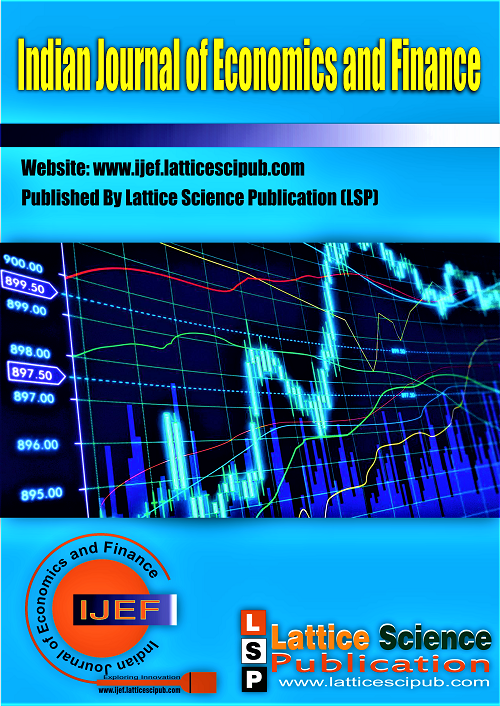Strengthening Financial Resilience: A Holistic Approach to Combatting Fraud
Main Article Content
Abstract
Financial fraud poses a persistent threat to individuals, businesses, and the broader economy, requiring a proactive and collaborative response. This paper navigates through the intricate landscape of financial fraud, addressing its various dimensions and offering a comprehensive strategy to fortify defenses. The overarching theme revolves around the critical nexus of innovation and entrepreneurship in the financial sector. Recognizing the significance of these elements in shaping the contemporary business environment, the paper elucidates the key challenges and opportunities they present. The literature review provides a thorough examination of existing studies on innovation and entrepreneurship, identifying gaps and areas for further research. Major theories, frameworks, and models relevant to the theme are explored, supplemented by insightful case studies showcasing successful endeavors in these domains. A meticulously crafted conceptual framework integrates essential concepts related to innovation and entrepreneurship. This framework not only clarifies key terms but also informs the subsequent analysis by establishing theoretical underpinnings. The research methodology section delineates the chosen approach, whether qualitative, quantitative, or a mix of both. It justifies the selected methods, outlines data collection techniques, sampling strategies, and acknowledges any inherent limitations. Moving into the heart of the paper, the analysis and findings section presents the results of research or analysis. Visuals such as charts or graphs augment the discussion, offering a visual representation of key findings. These findings are then dissected and connected back to the conceptual framework and the literature reviewed. In the subsequent discussion section, the results are interpreted within the broader context of innovation and entrepreneurship. Practical implications for businesses, policymakers, or researchers are dissected, addressing unexpected results and limitations encountered during the study. Possible avenues for future study are also discovered. The concluding section ties together the main points, revisits the initial objectives, and emphasizes the paper’s key contributions to the field. The conclusion doesn’t merely recapitulate; it offers practical insights and recommendations derived from the collective insights gained throughout the paper. In essence, this paper provides a roadmap for fortifying defenses against financial fraud, proposing recommendations for businesses, policymakers, and regulatory bodies. By embracing collaboration, technological innovation, and prioritizing awareness, the strategies outlined aim to contribute to a more secure financial landscape.
Downloads
Article Details

This work is licensed under a Creative Commons Attribution-NonCommercial-NoDerivatives 4.0 International License.
How to Cite
References
Akhgar, B., Arabnia, H. R., & Sani, S. (2015). Cyber crime and cyber terrorism investigator’s handbook. Syngress.
Albrecht, W. S., Albrecht, C. O., Albrecht, C., & Zimbelman, M. F. (2009). Fraud examination. Cengage Learning. https://doi.org/10.4016/10828.01
Albrecht, W. S., Albrecht, C. O., Albrecht, C., & Zimbelman, M. F. (2016). Fraud examination and prevention. Routledge.
Board of Governors of the Federal Reserve System. (2020). Wells Fargo: Consent Order for a Civil Money Penalty. https://www.federalreserve.gov/newsevents/pressreleases/files/enf20200908a1.pdf.
Button, M., Cross, C. (2017). Cyber Frauds, Scams and their Victims. Routledge. DOI: 10.4324/9781315679877. https://doi.org/10.4324/9781315679877
Button, M., Aleem, A. & Brooks, G. (2013). Fraud, corruption, and sport. Springer.
Coffee Jr., J. C. (2005). A theory of corporate scandals: Why the USA and Europe differ. Oxford Review of Economic Policy, 21(2), 198-211. https://scholarship.law.columbia.edu/faculty_scholarship/1359. https://doi.org/10.1093/oxrep/gri012
Cressey, D. R. (1953). Other people’s money: A study in the social psychology of embezzlement. Free Press.
Geis, G. (2015). White-Collar and Corporate Crime. Oxford University Press.
Grabosky, P., Smith, R., Dempsey, G. (2001). Electronic Theft: Unlawful Acquisition in Cyberspace. Cambridge University Press.
Heneriques, D. B. The Wizard of Lies: Bernie Madoff and the Death of Trust. St. Martin’s Griffin.
Hugo van Driel (2019) Financial fraud, scandals, and regulation: A conceptual framework and literature review, Business History, 61:8, 1259-1299, DOI: 10.1080/00076791.2018.1519026. https://doi.org/10.1080/00076791.2018.1519026
International Business Machine. (2024, January). What is blockchain technology? “Blockchain success starts here. https://www.ibm.com/topics/blockchain.
Joshi, A. & Jain, A. Top Financial Scams in India. (2024, February 6). Forbes Advisor India. https://www.forbes.com/advisor/in/personal-finance/financial-scams-in-india/.
Levi, M. (2018). Green with envy: Environmental crimes and black money. Spapens, T. et al. eds. Green Crimes and Dirty Money. London: Routledge, pp. 179-196. DOI: 10.4324/9781351245746-10. https://doi.org/10.4324/9781351245746-10
May, C. (2017, March). Transnational Crime and the Developing World. Global Financial Integrity. https://www.gfintegrity.org/wp-content/uploads/2017/03/Transnational_Crime-final.pdf.
McLean, B. & Elkind, P. The Smartest Guys in the Room: The Amazing Rise and Scandalous Fall of Enron Portfolio. Penguin Books Limited.
Ministry of Finance, Government of India. (2024, January). https://fimin.nic.in.
National Payments Corporation of India. (2024, January). Unified Payments Interface. https://www.npci.org.in/what-we-do/upi/product-overview.
Shu, K., Sliva, A., Sampson, J., Liu, H. (2018). Understanding Cyber Attack Behaviors with Sentiment Information on Social Media. In: Thomson, R., Dancy, C., Hyder, A., Bisgin, H. (eds) Social, Cultural, and Behavioral Modeling. SBP-BRiMS 2018. Lecture Notes in Computer Science (LNISA,volume 10899), vol 10899. Springer, Cham. https://doi.org/10.1007/978-3-319-93372-6_41.
Wells, J. T. (2017, March). Corporate fraud handbook: Prevention and detection. John Wiley & Sons.
Wells, J. T. (2013, October). Principles of fraud examination. John Wiley & Sons.
Zwass, V. (2014). Editorial Introduction. Journal of Management Information Systems, 31(3), 1-3. DOI: 10.1080/07421222.2014.994587.





